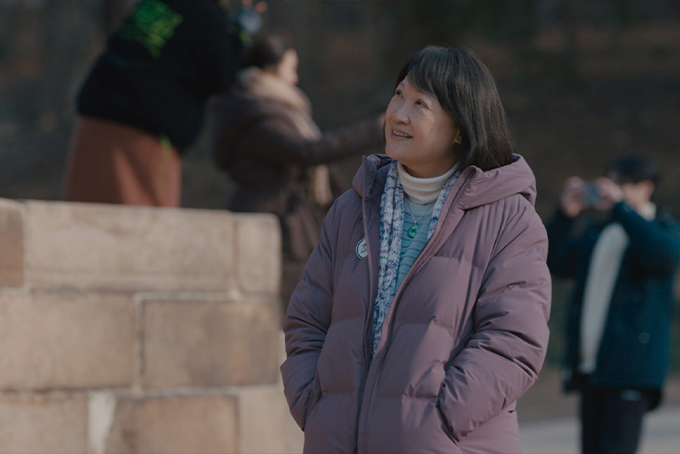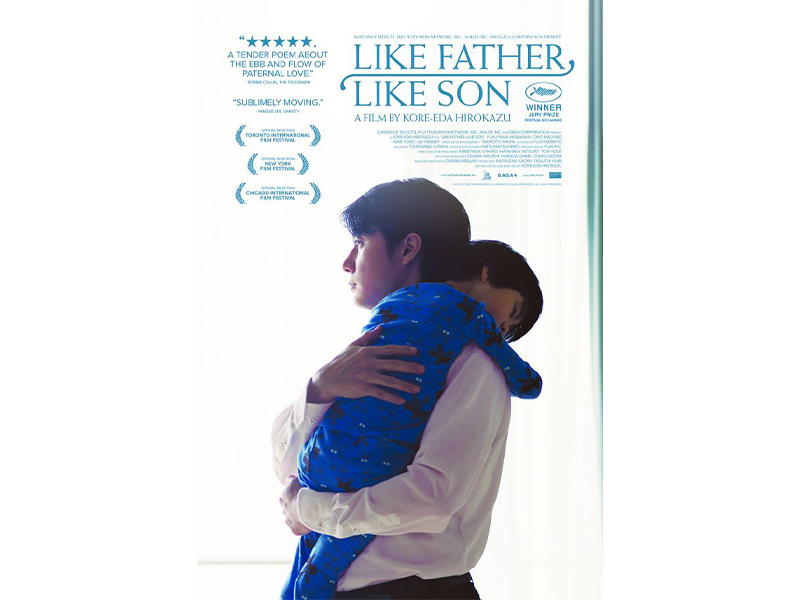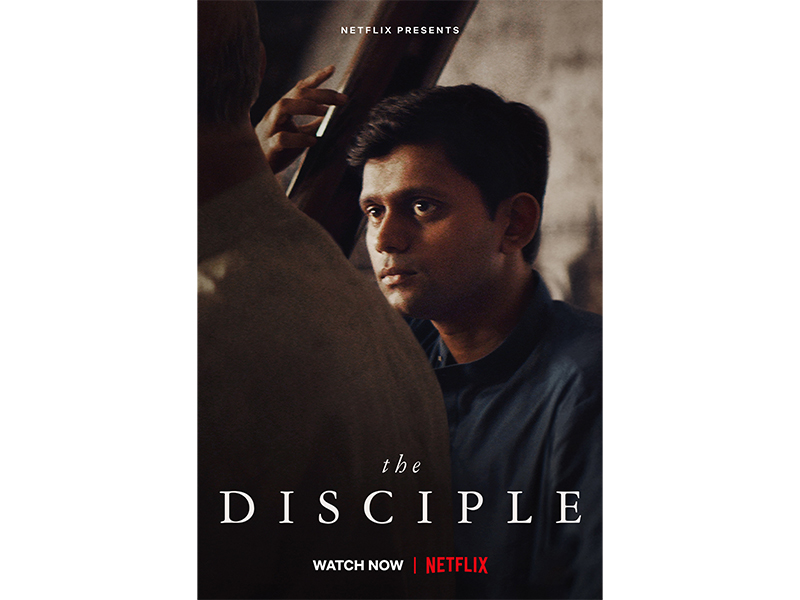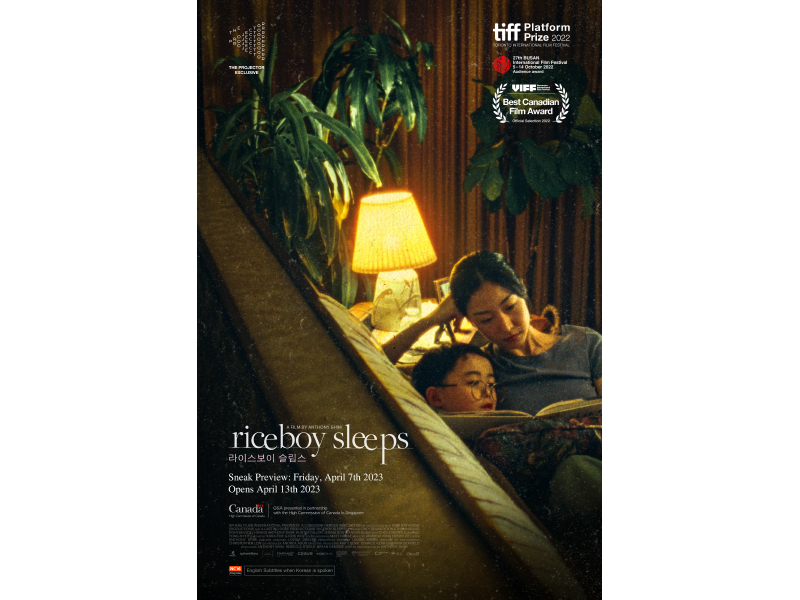From recent conversations on intergenerational trauma to long-standing debates on the merits of tiger parenting, Asian upbringing and parenthood have been in the spotlight as of late. With deep understanding of its many facets, Singaporean-South Korean production Ajoomma is a recent and welcome addition to the line of acclaimed titles that have brought the discussion onto the big screen.
“The genesis of the film came from my mum,” shares He Shuming, the director and co-writer behind the film. Equal parts heartfelt and humorous, his debut feature follows middle-aged K-drama fanatic Auntie as she gets lost in Seoul. Led on an unexpected journey of self-discovery, she is left to ruminate on life beyond the roles of daughter, wife and mother.
“When I first moved to LA about seven years ago, my mum and I had the habit of doing Skype calls—and she would do very good recaps of the Korean dramas that she had watched, which made me curious about the enthusiasm surrounding the genre,” he shares, “At the same time, I started thinking about our relationship as mother and son. For her, she was seeking out a new chapter. For me, I was contemplating my responsibilities as a son, and what I needed to do if I wanted to move away from Singapore.”

While the initial inspiration for Auntie came from his mother, he notes that the final iteration of the character is a culmination of input from many different women. “After we cast Hong Hui Fang in the role, for example, she brought in her own experiences as a mother and a daughter.”
In the months following the film’s release, it has earned an impressive list of accolades, including nominations at the Busan International Film Festival and Golden Horse Awards, as well as the honour of being Singapore’s submission to the 2023 Oscars in the Best International Film category. The reception from the audience, too, has been warm.
“It’s always nice to hear from viewers—or from my mum’s friends who have sent her voice messages—that they feel seen after watching the film. Even just hearing from people who say the film made them think about their mums or about their children is very meaningful,” he muses, “There’s also a very subtle but clear stance on acceptance in regards to the LGBTQ community that I wanted Auntie to take. Perhaps when it comes from the point of view of a mother, it might soften the position and make it easier for an audience to see that it’s not a very big deal. At the same time, I hope they understand the gravity and emotional weight of the decisions made by the characters in the film.”

As for his own mother’s reaction to the film, the filmmaker admits, “I was very stressed about her seeing the film. She’s been hearing me talk about it for so many years. I’ve also mentioned in the press that the film was inspired by her, so I think she felt like there was a little bit of projection. She said she liked it, but she thought it was very short—so you can’t always please your Asian mum [laughs]. But one comment she made stuck with me. She asked me why the character of Auntie was so sad, which initially confused me, but also made me think about how she views the character.”
Here, He rounds up a diverse selection of films that have captured the distinct nuances of Asian parent-child relationships over the years—some of which, he shares, have played a part in inspiring his own film.

1 / 9
Hi, Mom (2021)
“Created as a tribute to the film-maker’s own mother, Hi, Mom is the world’s highest grossing film made by a solo female director. It tells the story of a young Chinese woman who travels back in time and befriends her late mother. Director Jia Ling also plays the lead and serves as co-writer.”

2 / 9
Like Father, Like Son (2013)
“This is one of my favourite films by director Hirokazu Koreeda. Two babies are accidentally swapped at birth and raised by families of different social status. Now aged six, they are faced with the heart-breaking prospect of returning to their birth families. Koreeda never reduces his characters to stereotypes even as they shift through the perennial question of nature versus nature.”

3 / 9
Mother (2009)
“The ending of Bong Joon-ho’s Mother remains one of the most memorable scenes in contemporary cinema for me. As a mother’s undying love for her son causes their lives to mirror each other in terrible ways, this Hitchcockian thriller serves as a character study into the darkest depths of the human psyche.”

4 / 9
The Disciple (2020)
“Chaitanya Tamhane’s sophomore film is a triumph. A Marathi-language feature about an Indian classical musician’s unwavering devotion to his craft following the traditions of his father and mentors, The Disciple stars Aditya Modak who is impressive in his debut role as protagonist Sharad Nerulkar.”

5 / 9
Riceboy Sleeps (2022)
“In Riceboy Sleeps, Choi Seung-yoon gives an affecting performance as a Korean single mother who moves to suburban Canada seeking a better life for her son. Winning the Platform Prize at the Toronto International Film Festival, Korean-Canadian director Anthony Shim’s second feature explores the intimate diasporic spaces both mother and son occupy as they navigate a new-found land.”

6 / 9
The Way We Are (2008)
“Hong Kong auteur Ann Hui is known for her intimate films about women in Hong Kong, such as The Stuntwoman, which stars Michelle Yeoh in one of her best roles. One of the films I referenced for Ajoomma was Hui’s The Way We Are, which is about a widowed, single mother who finds it easier to help her older neighbour than to deal with her own family.”

7 / 9
Tokyo Story (1953)
“Yasujirō Ozu’s magnum opus is undoubtedly Tokyo Story, a film that is on every film school curriculum, and rightfully so. Ozu examines the changing values of 1950s Japan through the intergenerational divide of a family when elderly grandparents are brushed aside by their self-involved adult children. This is the ultimate film about family.”

8 / 9
Little Big Women (2020)
“Taiwanese director Joseph Hsu’s debut melodrama was a breakout hit. Lensed by fellow Singaporean cinematographer Jon Keng, Little Big Women follows a matriarch as her estranged husband passes away on her 70th birthday, leaving her and her three daughters to pick up the remnants of the family’s past relationships.”

9 / 9
The Wedding Banquet (1993)
“Nominated for an Oscar and a Golden Globe for Best Foreign-Language Film, The Wedding Banquet follows a gay Taiwanese immigrant in New York City who marries a mainland Chinese woman in order to placate his parents and get her a green card. Trouble ensues when his parents arrive to plan the wedding and he has to hide the identity of his male partner.”
Order your copy of the May/June ‘Guardian’ issue of Vogue Singapore online or pick it up on newsstands.





